Overview
This article presents essential vineyard SEO strategies that wineries can implement to significantly boost sales, highlighting the critical role of direct-to-consumer (DTC) approaches. It outlines various effective tactics, including:
- Mobile optimization
- Local SEO
- Content creation
- Storytelling
Each of these strategies enhances online visibility and fosters consumer engagement, ultimately driving increased sales for wineries. By employing these strategies, wineries can navigate the challenges of the modern market and establish a stronger connection with their customers.
Introduction
The wine industry is experiencing a profound transformation, as family-owned wineries increasingly seek innovative methods to engage consumers and elevate sales. By leveraging effective vineyard SEO strategies, these establishments can not only enhance their online visibility but also craft compelling narratives that resonate with potential customers. As competition intensifies, wineries must consider:
- How can they distinguish themselves in a crowded market?
- How can they effectively drive direct-to-consumer sales?
This pressing question underscores the necessity for strategic approaches that not only capture attention but also foster lasting connections with consumers.
Enocap: Transformative DTC Strategies for Family-Owned Wineries
stands at the forefront of developing tailored that empower family-owned vineyards to forge meaningful connections with their clientele. By optimizing online retail platforms, enhancing wine club memberships, and implementing effective vineyard SEO strategies for demand generation and retention programs, vineyards can substantially increase their sales. A pivotal aspect of this strategy is storytelling; Enocap aids vineyards in that resonate with consumers, ultimately elevating both sales and customer loyalty.
Recent trends reveal a significant transformation within the wine industry, characterized by remarkable growth in . For instance, establishments producing fewer than 2,500 cases annually reported a 6% increase in wine club memberships, underscoring the potential for through . Moreover, with the average vineyard now selling approximately 70% of its production directly to consumers, there is a .
Successful case studies further exemplify the efficacy of these strategies. Wineries that embraced in their tasting rooms experienced a 35% surge in visitation, particularly among affluent consumers aged 30 to 45. This illustrates how customized experiences can significantly and drive sales.
Industry leaders stress the indispensable role of storytelling in shaping consumer purchasing decisions. By harnessing data-driven insights and established methodologies, Enocap equips wine producers with vineyard SEO tools to navigate the complexities of contemporary wine sales, ensuring they remain competitive in an ever-evolving market landscape. To optimize your DTC initiatives, consider consistently analyzing customer feedback to refine your offerings and bolster engagement.
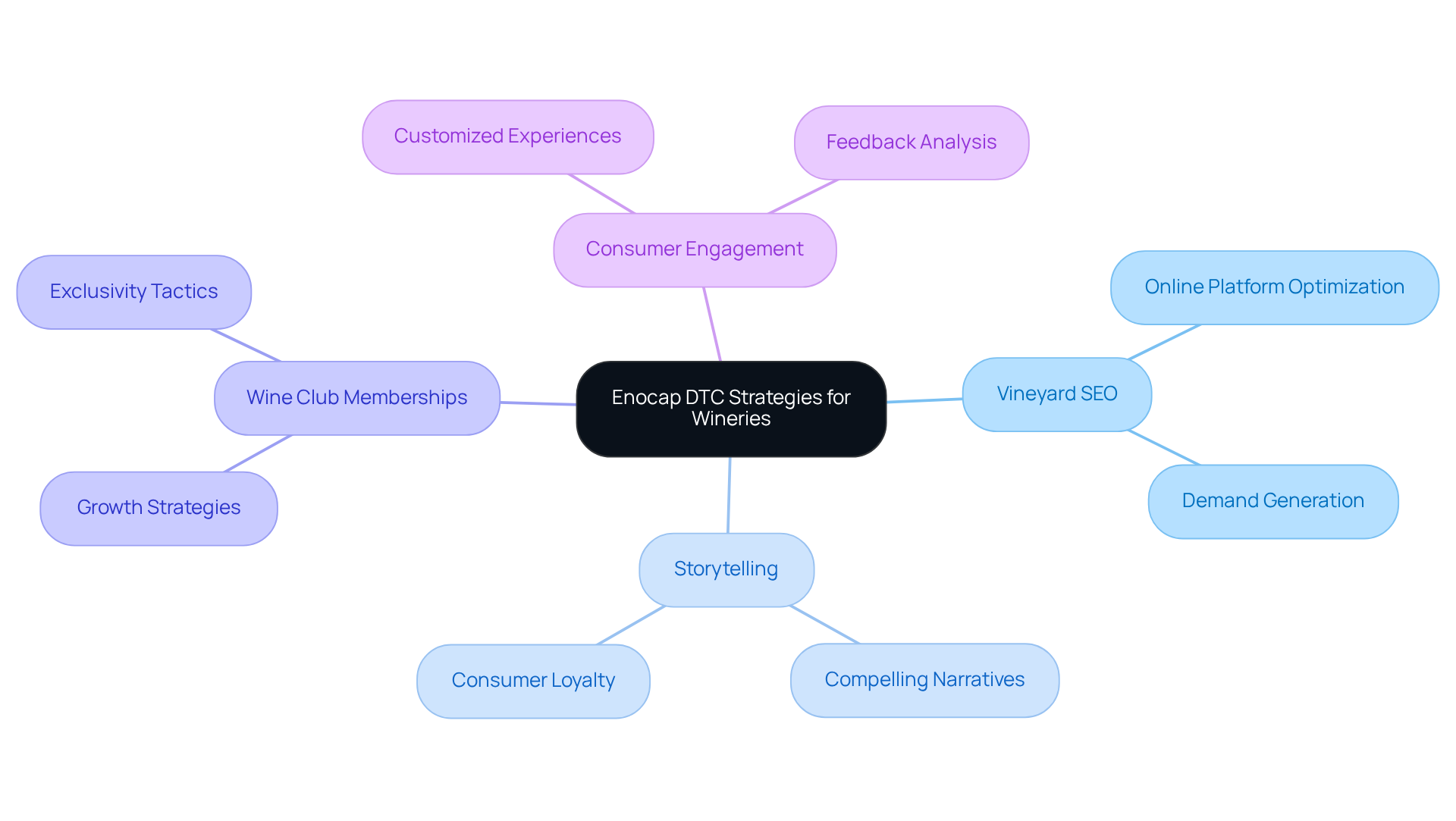
Mobile Optimization: Enhance User Experience for Better SEO
To enhance user experience and improve SEO, businesses must prioritize . This necessity involves creating responsive layouts, ensuring fast loading times, and facilitating easy navigation. By applying efficient techniques, businesses can significantly reduce bounce rates and enhance conversion rates. In fact, mobile-friendly sites experience an average rise of 67% in conversions for those that invest in mobile optimization. Tools such as Google’s Mobile-Friendly Test, PageSpeed Insights, and Google Search Console’s URL Inspection tool are invaluable for and identifying areas for improvement.
Considering that 40% of online transactions occur on mobile devices and 69% of digital media time in the U.S. is spent on mobile devices, a is crucial for engaging clients and . Successful examples of demonstrate that not only improves visibility but also fosters and increases revenue. As mobile internet usage continues to rise, wineries that neglect vineyard SEO and mobile optimization risk losing significant sales opportunities and diminishing their online presence.
In today’s digital era, a mobile-friendly website isn’t just a choice—it’s a necessity. Embracing mobile optimization is essential for staying competitive and ensuring long-term success in the wine industry.
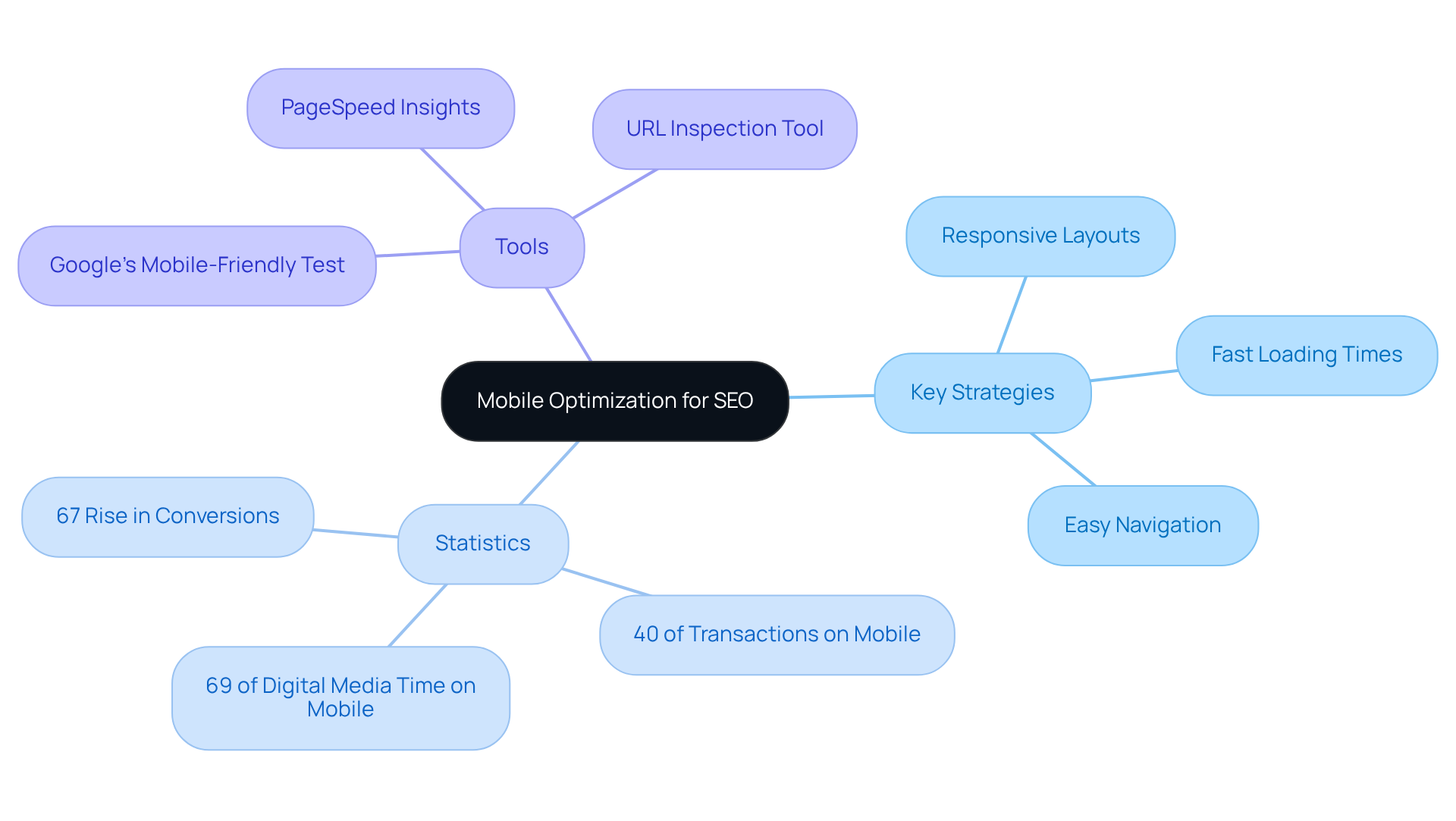
Local SEO Mastery: Attract Wine Enthusiasts to Your Winery
Wineries must prioritize vineyard SEO tactics to attract nearby wine enthusiasts while also leveraging to bolster . This involves:
- Enhancing
- Ensuring consistent NAP (Name, Address, Phone number) details across platforms
- Integrating
By engaging with and forming partnerships, wineries can not only boost visibility but also cultivate relationships with potential customers, transforming casual buyers into devoted club members.
Regularly updating local listings with fresh information and promotions can significantly improve local search rankings, paving the way for for .
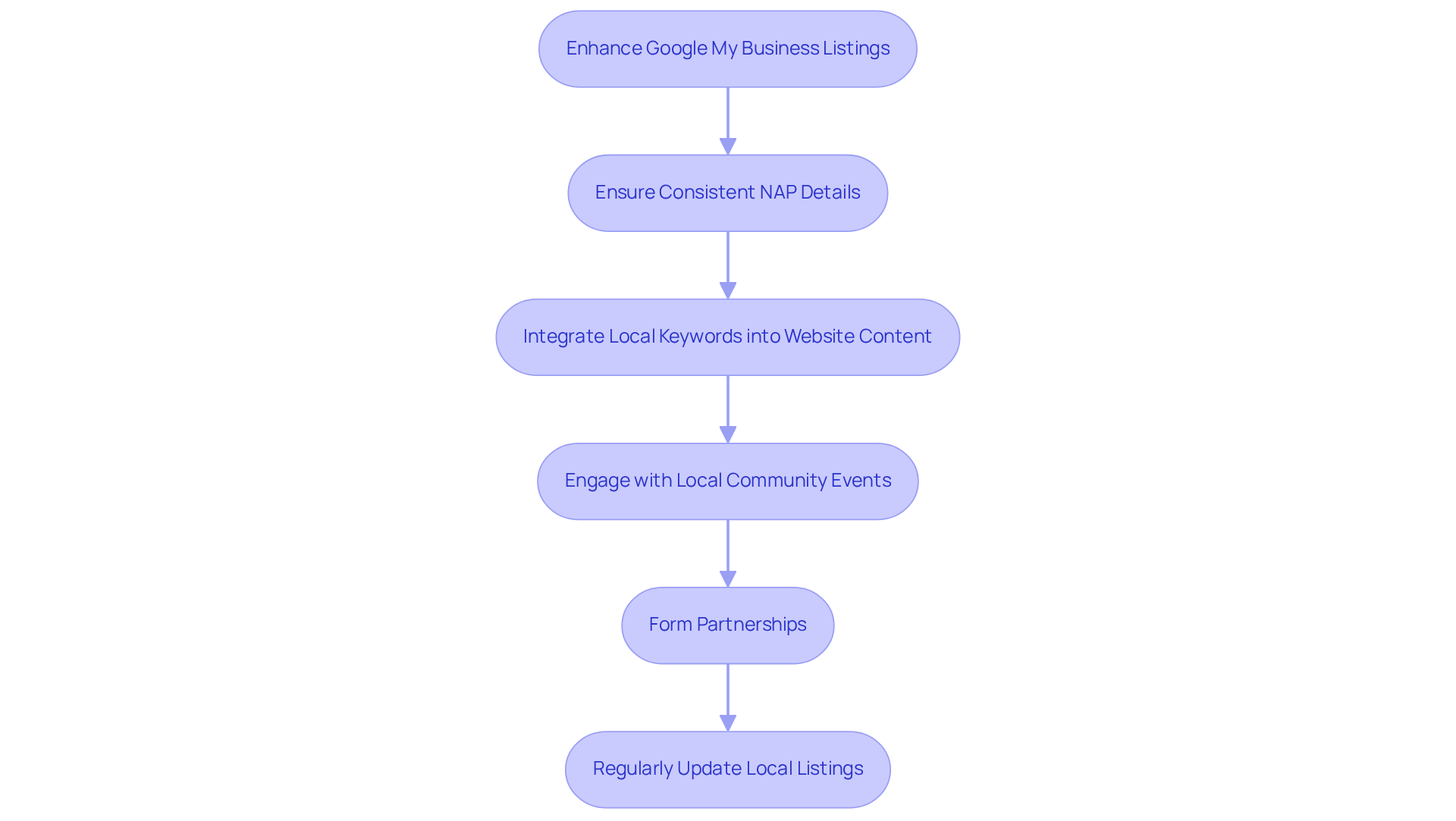
On-Page Optimization: Craft Engaging Content for Higher Rankings
On-page optimization is essential for wineries aiming to through . This process involves refining website components such as titles, meta descriptions, headers, and text to align with targeted keywords. Wineries must prioritize the creation of high-quality, that not only narrates their but also aligns with vineyard SEO by incorporating relevant keywords. This dual focus not only boosts search engine rankings but also enriches the user experience, encouraging visitors to delve deeper into what the establishment offers.
As Jill Barth emphasizes, effective vineyard SEO ensures that businesses appear prominently in search results, thereby and visibility for local wineries. Furthermore, meticulous for specific wines and seasonal occasions is vital, as highlighted by Ben Jayston, to ensure that content resonates with potential clients. Regular assessment of is crucial for adapting strategies effectively.
Current trends indicate that engaging content is indispensable for SEO success, fostering connections with potential customers and enhancing brand loyalty. By implementing these strategies, including a focus on vineyard SEO and the use of , vineyards can significantly elevate their online visibility and attract a broader audience.
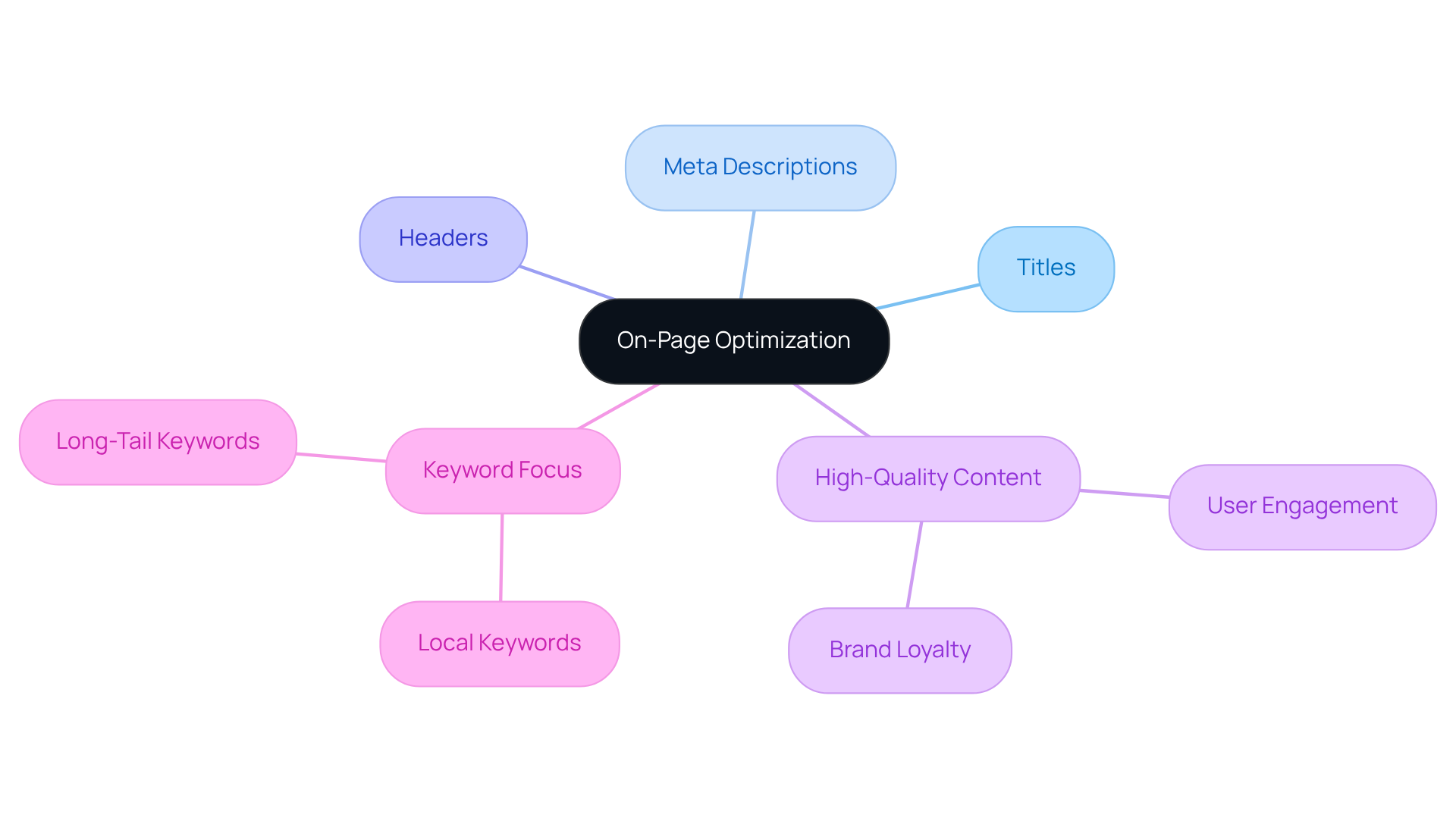
Link Building: Strengthen Your Winery's Online Authority
To enhance online authority, vineyards must prioritize through the acquisition of . A strategic approach involves:
- Guest blogging on
- Partnering with local businesses
- Actively engaging in industry events
These initiatives not only foster community connections but also significantly improve visibility. Moreover, creating shareable content—such as infographics, engaging videos, and insightful articles—can attract . As industry experts emphasize, from reputable sources are far more advantageous than numerous low-quality links.
Monitoring backlink profiles using tools like Ahrefs or Moz allows vineyards to assess their and uncover new growth opportunities. A robust backlink strategy is essential for enhancing and attracting targeted traffic to vineyard SEO websites.
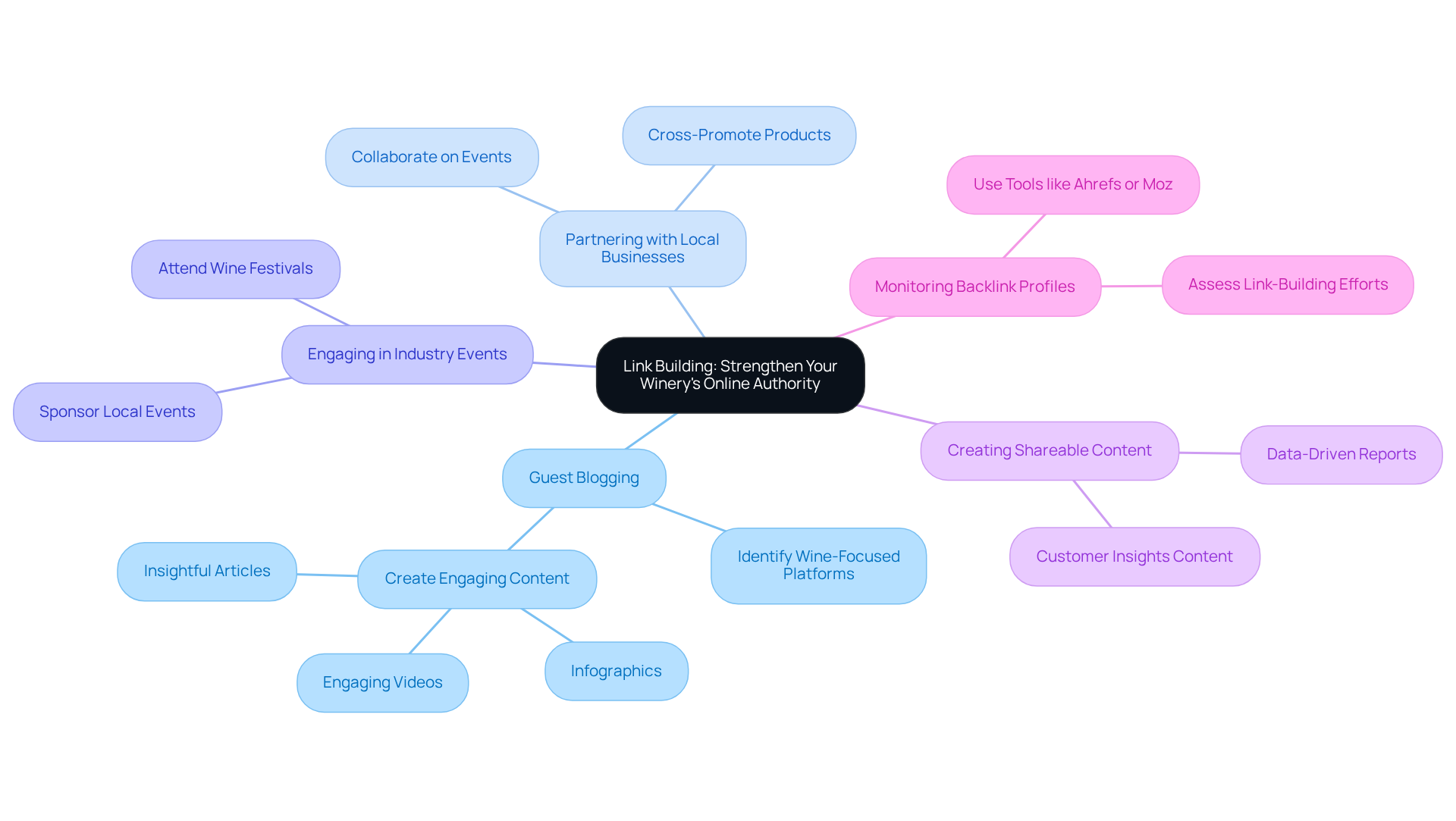
Content Creation: Share Your Winery's Unique Story
Wineries must focus on crafting content that powerfully illustrates their , heritage, and winemaking techniques to enhance their . This can manifest through:
- Blog posts
- Captivating videos
These elements embody the establishment's core values and . not only but also plays a crucial role in vineyard SEO by cultivating deeper brand loyalty. For instance, establishments like Echolands Vineyard have adeptly leveraged platforms such as Instagram and TikTok to showcase their picturesque views and sustainability initiatives, resonating with a younger demographic.
Furthermore, video content has proven particularly effective; a video detailing the origins of Cabernet achieved 91,000 views, substantially . By harnessing platforms like Instagram and YouTube, vineyards can utilize vineyard SEO to expand their reach and foster a more personal connection with consumers, ultimately driving engagement and loyalty.
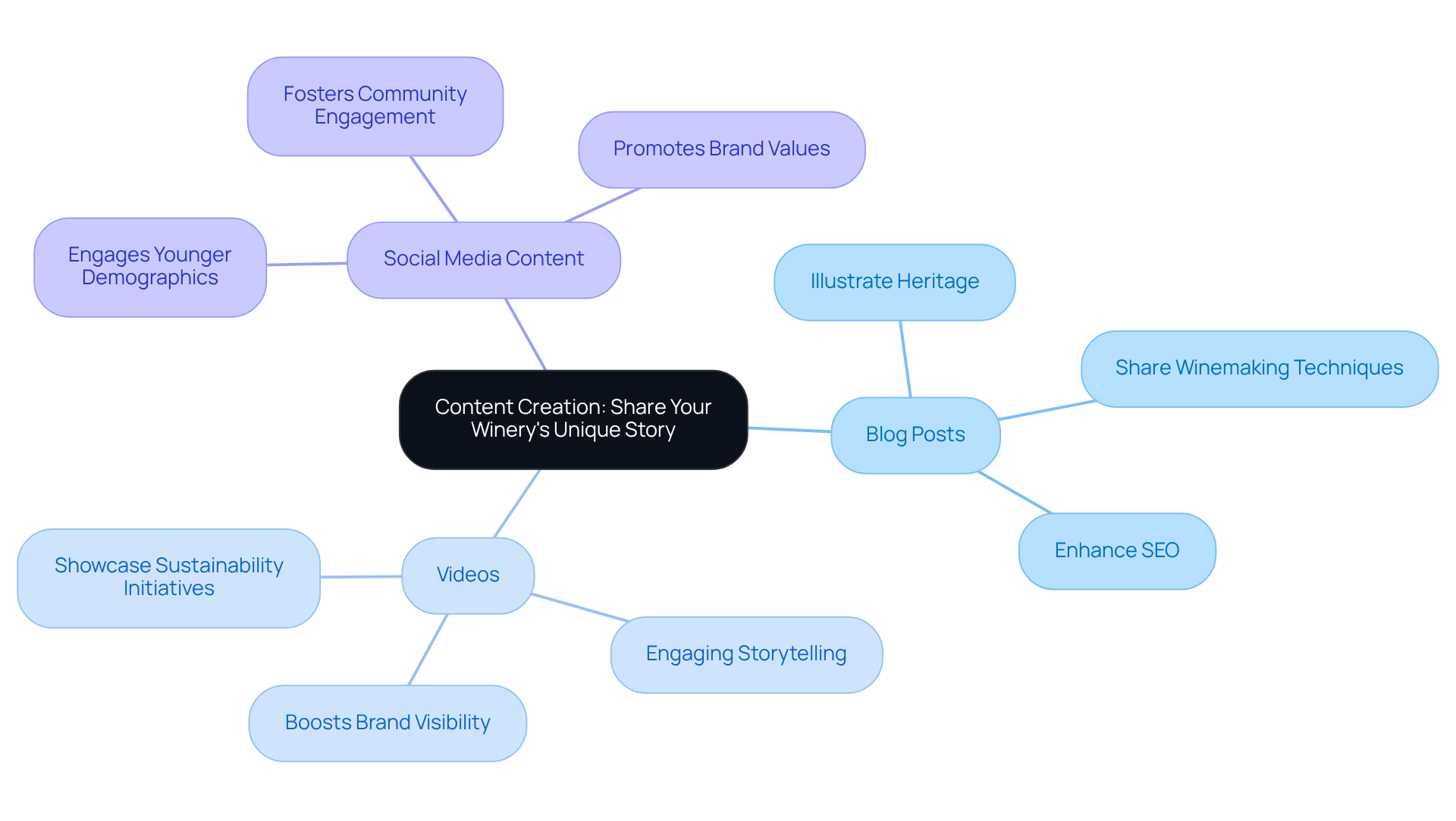
Social Media Integration: Engage and Expand Your Audience
Incorporating is essential for , as it helps vineyards forge direct connections with their audience and drive sales. By leveraging vineyard SEO and strategies, vineyards can effectively transform casual buyers into loyal club members. Consistently sharing updates, promotions, and behind-the-scenes content is essential for vineyard SEO as it fosters a sense of community and encourages engagement among followers. Platforms such as Facebook, Instagram, and Twitter serve as powerful tools for vineyard SEO, allowing 45% of to utilize these channels to seek information about wines and wineries. Moreover, utilizing vineyard SEO to align social media content with sustainability practices can significantly enhance , as 73% of consumers globally are willing to pay a premium for sustainable products.
Running , as demonstrated by successful campaigns like Gervasi Vineyard's, which achieved an impressive click-through rate of 2.14%, surpassing industry benchmarks and showcasing the effectiveness of vineyard SEO. Gervasi's strategy combines unique visitor experiences with targeted vineyard SEO social media campaigns, showcasing a comprehensive marketing approach. Engaging with followers through comments and messages not only cultivates but also improves vineyard SEO by creating authentic connections that resonate with consumers. Additionally, leveraging user-generated content can broaden a vineyard's reach and promote , making it a vital component of vineyard SEO and social media strategy.
To maximize impact, vineyards should adhere to a of 3-5 times per week, signaling activity and fostering trust among followers. By analyzing audience behavior through tools like Instagram analytics, wine producers can refine their content strategy to improve vineyard SEO, ensuring alignment with their goals and responsiveness to audience preferences. This data-driven approach not only boosts engagement but also drives long-term profitability, making vineyard SEO an indispensable asset in the competitive wine industry. By crafting and strategically planning capital investments, vineyards can further enhance their growth and loyalty in the market through vineyard SEO, ensuring sustainable success.
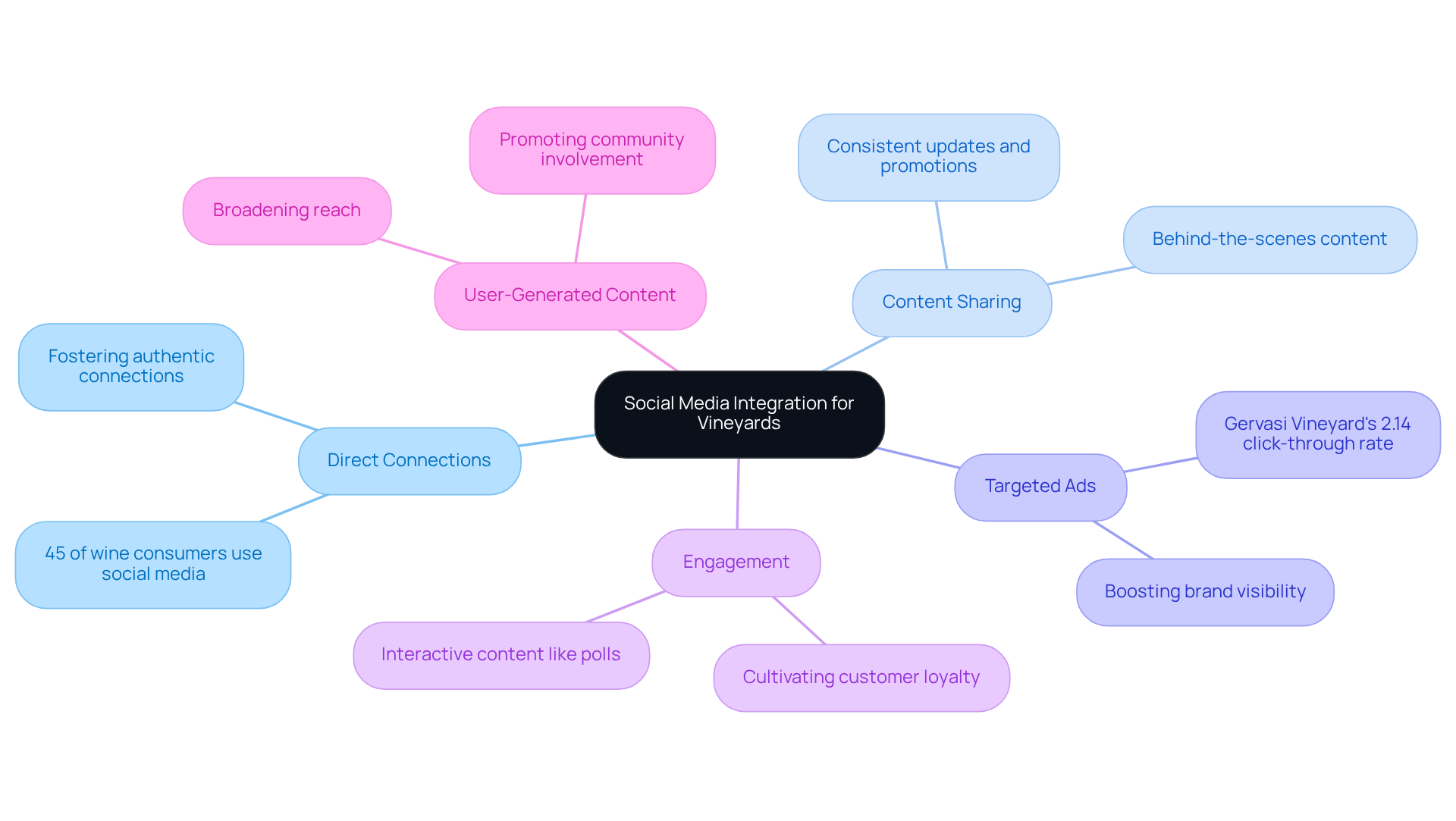
Technical SEO: Optimize Your Website for Search Engines
Wineries must prioritize to . This means , ensuring , and implementing secure HTTPS protocols. Regular audits with tools like are essential; they can identify and rectify technical issues that may impede search engine performance.
Furthermore, , , and significantly boost visibility in search results. By focusing on these elements, wineries can enhance their vineyard SEO, which will not only improve their online presence but also to their sites.
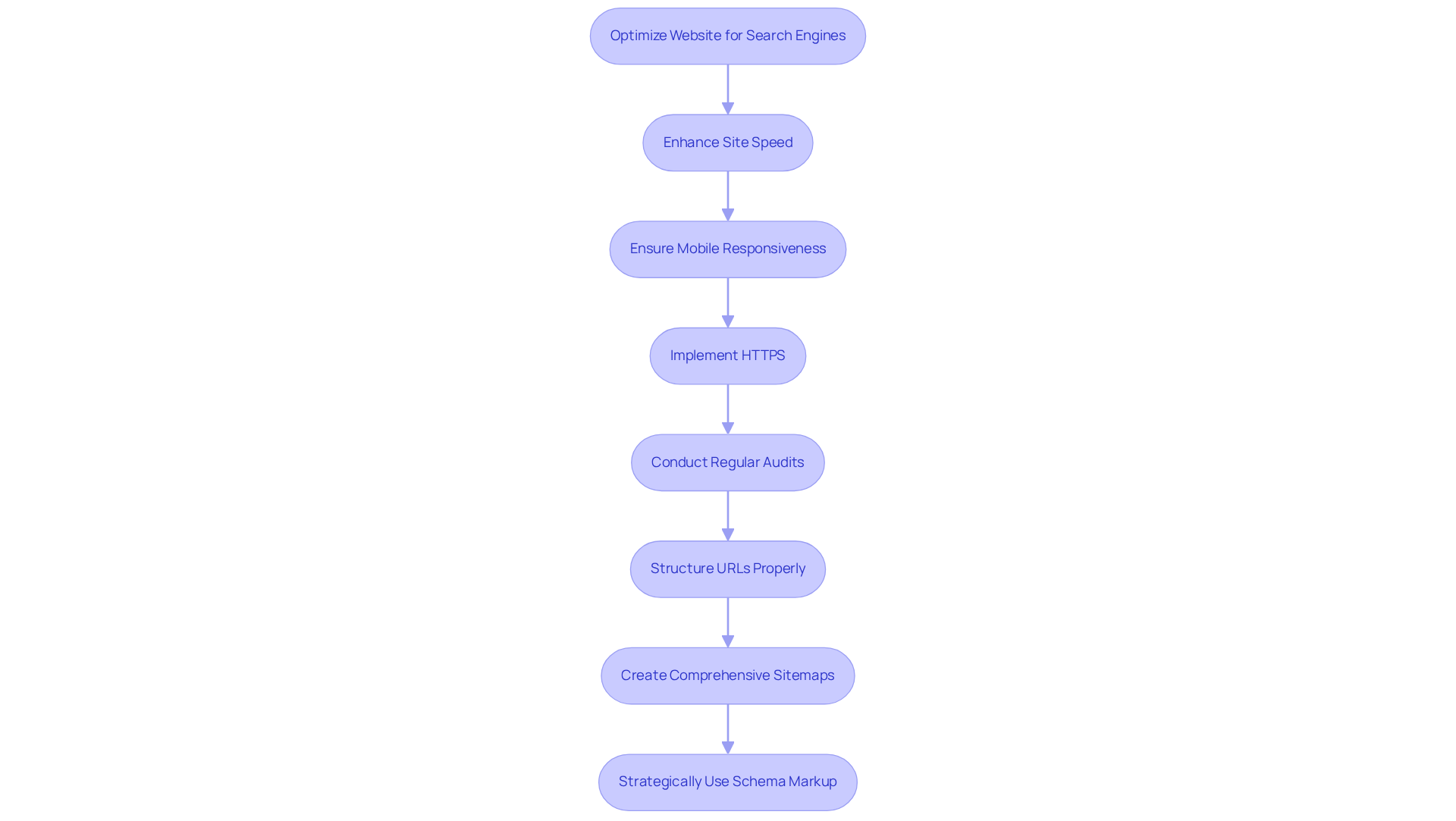
Keyword Research: Identify and Target Relevant Search Terms
Conducting thorough is essential for , as it helps vineyards that potential customers are utilizing. Tools like Google Keyword Planner and SEMrush empower vineyards to by uncovering directly associated with their products and services.
By focusing on , vineyards can attract more qualified traffic, enhancing their outreach. Furthermore, incorporating vineyard SEO keywords naturally into website content, blog posts, and product descriptions significantly and drives .
This strategic approach not only enhances the vineyard's online presence but also positions it as a .
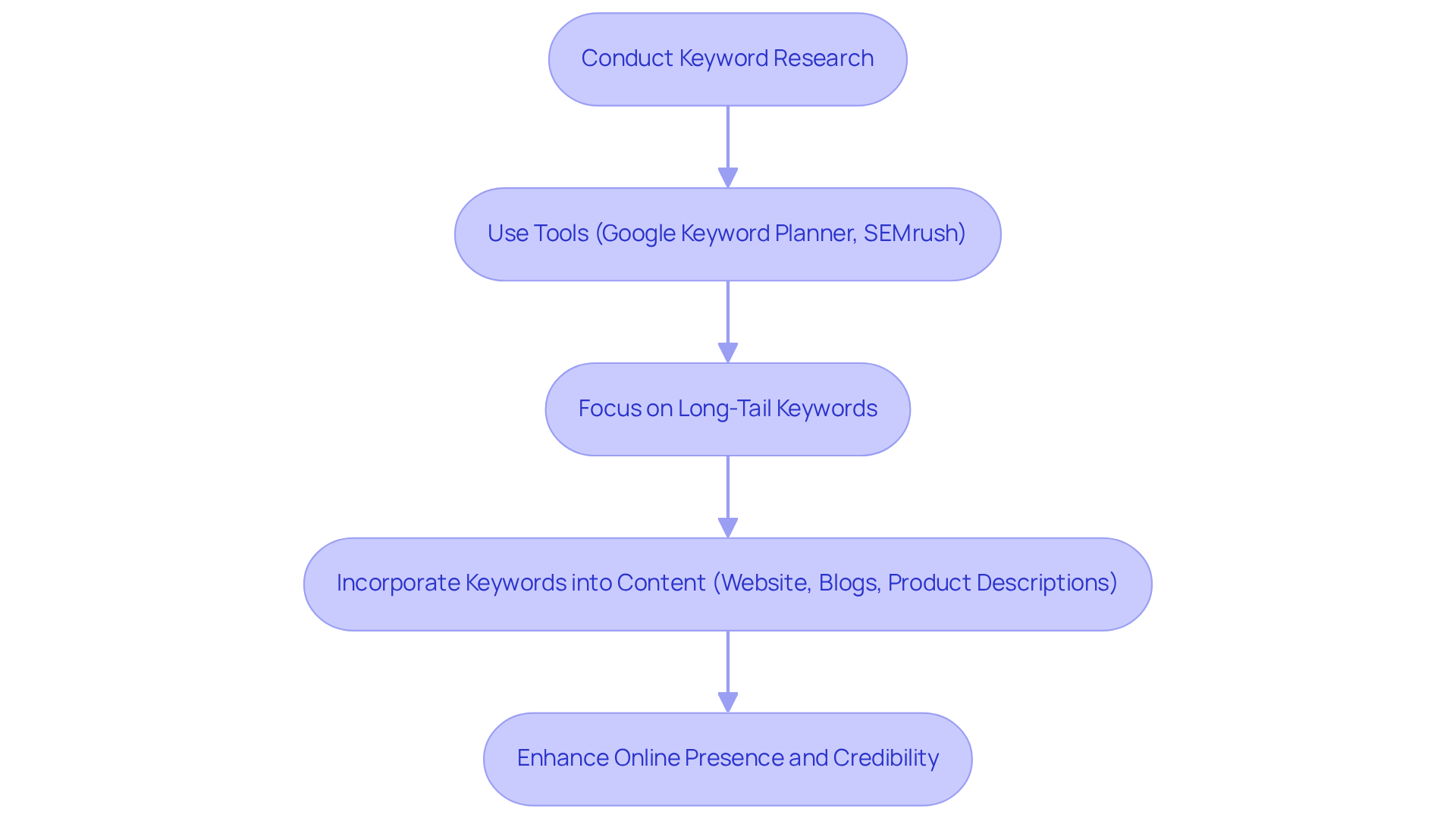
SEO Metrics Analysis: Track Performance and Optimize Strategies
Regular analysis of SEO metrics is essential for businesses seeking to and . Key performance indicators to monitor include:
- Organic traffic
- Bounce rates
- Conversion rates
- Keyword rankings
By utilizing tools such as and Ahrefs, vineyard SEO can help vineyards gain and website performance. For instance, tracking organic traffic can reveal which marketing approaches are effective, while monitoring bounce rates helps identify areas for improvement in user engagement.
Implementing a structured approach to performance tracking empowers businesses to make informed adjustments to their . By understanding which tactics yield the best results, wine producers can and effectively communicate their brand story to potential customers. This aligns with that drive consistent growth. Regular SEO analysis not only informs decision-making but also aligns with long-term business objectives, ensuring that businesses remain competitive in a dynamic market.
As emphasized by industry specialists, effective monitoring of is crucial for vineyards to adapt and thrive. By concentrating on quantifiable results, vineyards can refine their vineyard SEO strategies, ultimately leading to . Additionally, wineries should routinely review their Google Analytics data to adjust their vineyard SEO strategies, ensuring responsiveness to changing market dynamics and capitalizing on strategic opportunities for growth and investment.
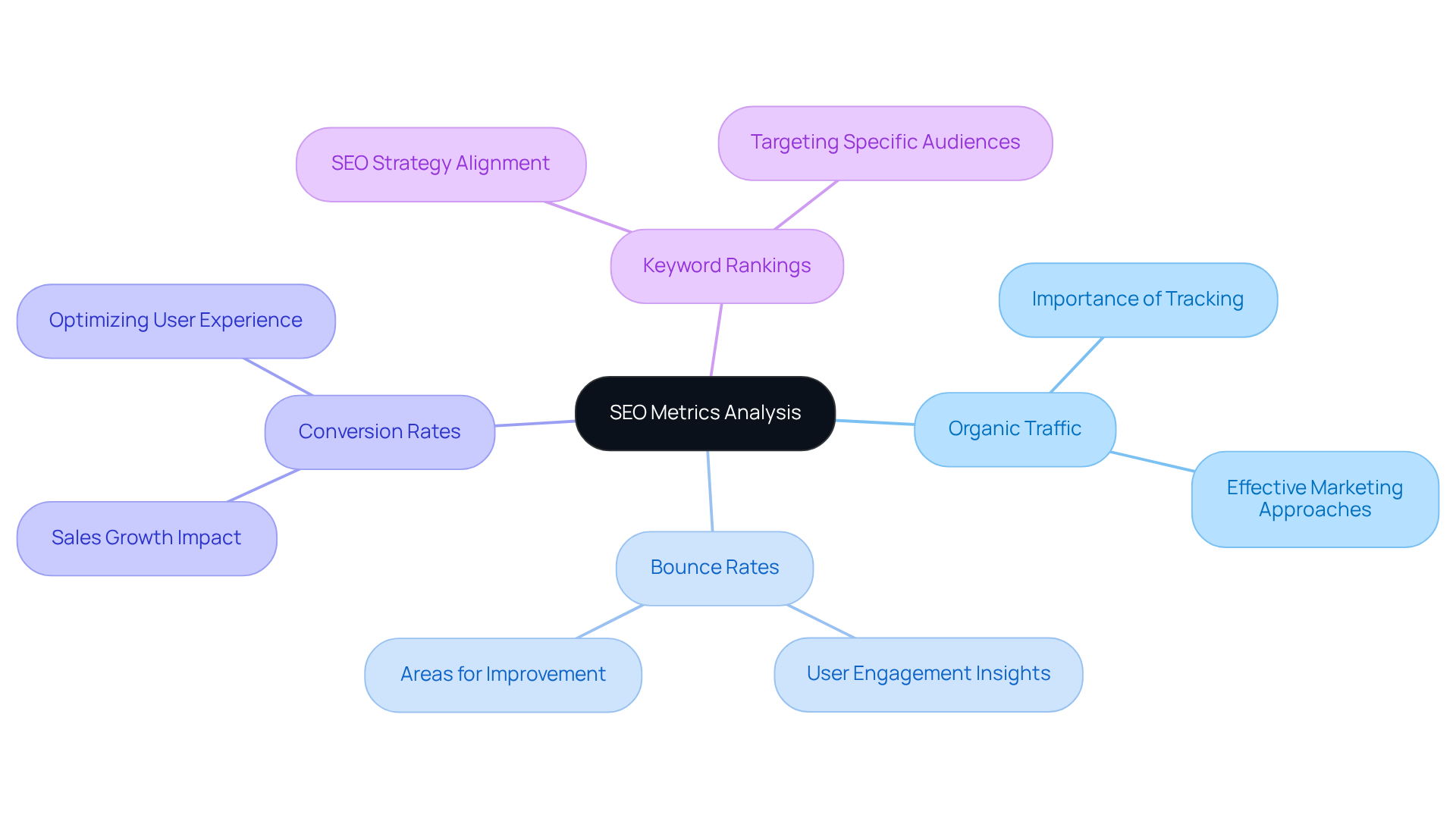
Conclusion
The strategies outlined in this article underscore the paramount significance of vineyard SEO for wineries aiming to amplify their sales and customer engagement. By concentrating on tailored approaches that include mobile optimization, local SEO, on-page strategies, and content creation, wineries can effectively engage with their target audience and drive direct-to-consumer sales. The integration of storytelling and community engagement further fortifies a vineyard's brand presence, allowing it to resonate with consumers on a deeper level.
Key insights from this discussion emphasize the necessity of optimizing online platforms and leveraging data-driven approaches to refine marketing efforts. Successful case studies illustrate that wineries implementing these strategies can witness substantial increases in customer loyalty and sales growth. The focus on mobile-friendly websites and local SEO tactics highlights the critical need to adapt to consumer behavior and preferences, which is essential for maintaining competitiveness in the wine industry.
Ultimately, the implementation of these vineyard SEO strategies transcends mere sales boosts; it is about cultivating enduring relationships with customers and establishing a robust brand identity. Wineries are encouraged to adopt these transformative marketing techniques, continuously analyze their performance metrics, and adjust their strategies to ensure sustainable growth and success in a dynamic marketplace. Prioritizing these practices will not only enhance visibility but also foster a loyal customer base that appreciates the unique stories and experiences that each winery offers.
Frequently Asked Questions
What is Enocap and what strategies does it offer for family-owned wineries?
Enocap develops tailored vineyard SEO strategies that help family-owned wineries connect with their clientele. This includes optimizing online retail platforms, enhancing wine club memberships, and implementing effective demand generation and retention programs.
How important is storytelling in the strategies offered by Enocap?
Storytelling is a pivotal aspect of Enocap's strategy, as it helps vineyards craft compelling narratives that resonate with consumers, ultimately boosting sales and customer loyalty.
What recent trends have been observed in the wine industry regarding direct-to-consumer sales?
The wine industry has seen significant growth in direct-to-consumer sales, with establishments producing fewer than 2,500 cases annually reporting a 6% increase in wine club memberships. Additionally, the average vineyard now sells about 70% of its production directly to consumers.
What impact do customized experiences have on consumer engagement in wineries?
Wineries that have embraced innovative pricing and experiential adjustments in their tasting rooms experienced a 35% increase in visitation, particularly among affluent consumers aged 30 to 45, highlighting the importance of customized experiences in driving sales.
What role does mobile optimization play in enhancing user experience and SEO?
Mobile optimization is crucial for improving user experience and SEO. It involves creating responsive layouts, ensuring fast loading times, and facilitating easy navigation, which can significantly reduce bounce rates and enhance conversion rates.
How much do conversions increase for businesses that invest in mobile optimization?
Businesses that invest in mobile optimization can see an average rise of 67% in conversions.
Why is a mobile-friendly website essential for wineries?
A mobile-friendly website is essential for wineries because 40% of online transactions occur on mobile devices. With 69% of digital media time in the U.S. spent on mobile devices, a seamless mobile experience is crucial for engaging clients and boosting sales.
What local SEO tactics should wineries prioritize?
Wineries should enhance their Google My Business listings, ensure consistent NAP (Name, Address, Phone number) details across platforms, and integrate local keywords into their website content to attract nearby wine enthusiasts.
How can wineries improve their local search rankings?
Wineries can improve local search rankings by regularly updating local listings with fresh information and promotions, which can help boost visibility and cultivate relationships with potential customers.




